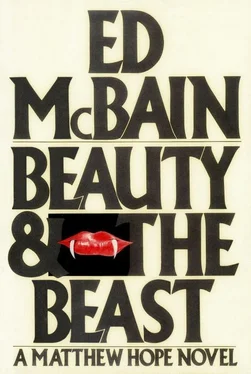“ Was it Michelle who called to warn you?”
“Oh, Jesus,” he said again, and then, almost as if he were glad to have it over with at last, he buried his face in his hands the way Harper had done in this same office almost three weeks earlier, and began weeping as he told us all of it from the beginning.
The tape unwound unmercifully, and the recent past was suddenly the immediate present.
Bonn.
This has been the capital of the Federal Republic of Germany since 1949, its population doubling to 300,000 once it became the seat of government. It sits on one bank of the Rhine, facing the Siebengebirge — the Seven Mountains — on the opposite bank. Adenauerallee, named for Dr. Konrad Adenauer, the first chancellor of the new democratic state, runs almost parallel to the river. It is said that Adenauer’s single vote caused this formerly quiet university town to become the new capital, and that his vote was premised on the region’s climate, supposedly genial to aging men.
The climate is rainy.
It rains here almost six months out of the year.
It is a rainy night in November, two years ago.
The setting is a bar in the baroque old quarter of the town, near the Kennedybrücke. Davis is sitting at a table with the blonde cabaret singer who is his date, waiting for Harper to arrive with the young girl he has fallen madly in love with, the nineteen-year-old named Michelle Benois, whom he’d met in a bar earlier this month. She comes in on his arm at a quarter past seven. Her long black hair cascades around a face that is beautiful but a trifle too made up. She is wearing a black cloth coat, and beneath that a clingy red dress cut low over her breasts and hugging her ample hips. He recognizes her at once for what she is: there are enough of them in Bonn. Georgie Harper has fallen in love with a hooker. (In bed with Davis later that night, the blonde singer asks, “ Ist das Mädchen eine Hure? ”)
He is surprised when Michelle calls him at the barracks the next day. She says she must see him. He thinks at once that business must be slow, too much free stuff being handed out to the servicemen by willing young Fräuleins. But he agrees to meet her later, and in a small bar near the Hofgarten, she tells him that she doesn’t know what to do about Harper. He has fallen madly in love with her, but of course she doesn’t care for him, how could anyone return the love of such a “ monstre ,” she says in French, such a monster. She is not referring to the brutality Davis later attributes to him. He admits to us now, as the tape relentlessly records his words, that he himself was the one who’d used his billy on any drunks they picked up (“I told you it was Georgie ’cause I figured that’d make him beating her up seem more likely, do you see?”). Michelle is referring instead to Harper’s looks , the apelike appearance of this “ monstre véritable, ” she says again in French.
They linger in the bar for close to two hours while she pours out her heart to him. He is thinking he would like to score with her, but not on her terms. He has never paid for it in his life, not at home, where his wife Leona is waiting for him to complete his four years of active duty, nor here in Germany either, where it can be had free just for the asking. He knows what her business is, but he broaches the possibility of a freebie, anyway, and is surprised when she readily agrees to it. In a hotel room on Koblenzstrasse, they make passionate love for the first time.
“I didn’t know she was going to get crazy later on,” he tells us now.
He continues seeing her. Harper knows nothing about their affair; Harper is blissfully in love with a girl who’s been hooking in Bonn ever since she was thirteen, when she fled Paris and the bourgeois existence she shared there with her French father and German mother. Davis doesn’t care what she is; in fact, her expertise is something new to him. There is never a moment in bed with her that he isn’t learning something he has never experienced before. On New Year’s Eve in Bonn, she pleads illness to get out of a date with Harper and instead arranges a small surprise for Davis. When he shows up at the hotel room she has booked in advance, she is waiting there with a voluptuous black girl who, like herself, is a hooker. “ Bonne année ,” she says and introduces Davis to what he will later remember as his first “triad.”
That was the real beginning,” he says now. “The real beginning of The Oreo, the beginning of everything.”
It is Davis , not Harper , who leaves Germany without calling Michelle. He considers her nothing more than what she is: a whore with a splendid bag of tricks. He is eager to get home, not to see his wife Leona, whom he considers something of a drudge, but instead “to feast on some soul food” (words he also attributes later to Harper), “the general black female population.” He does not know at the time that Michelle will follow him to the States in three months.
Nor does he know she is pregnant with his child.
She arrives in Miami shortly before Easter last year. She is wearing the same black cloth coat she’d been wearing when first he’d met her in Bonn. The weather is balmy and mild, but she is bundled inside her coat, trying to hide the swell of her pregnancy from the prying eyes of strangers. She does not have an address for Davis; he had refused to give her one before leaving Bonn. But she knows where to find Harper, who’d been asking her constantly to marry him and come live in the States with him. She goes first to the address Harper gave her in Bonn, but only to find out where she can locate Davis. Harper’s mother will not oblige her. Michelle must ask questions all over town before finally she can present herself on Davis’s doorstep with the announcement of her pregnancy and the threat that she will drown herself if he does not marry her. This will later become an inside joke between the lovers, and Michelle will recount with sly pleasure that these were the exact words she said to Harper when finally she proposed to him in Calusa.
By then, she has already undergone an abortion in Miami.
The abortion is Davis’s idea.
So is the suggestion that she marry Harper.
“I told her he was a hard worker,” he says now. “Told her she’d be getting herself a free meal ticket and meanwhile, you know, we could pick up where we’d left off in Germany. No reason for us to stop seeing each other, I told her. Business as usual. Georgie was a fuckin dunce, he’d never know what was going on between us.”
It might have remained that way, George Harper might never have found out about the continuing love affair between his wife and Lloyd Davis, if “circumstances” (as Davis now defines them) had not changed somewhat.
“It was Michelle’s idea,” he says. “Michelle was always the one with the ideas.”
The idea, as it occurs to Michelle in the month following her wedding to Harper, is that it would be nice to give her lover Lloyd a birthday present. His birthday is on the eighteenth of July; wouldn’t it be nice to arrange a little present for him on the following weekend? She has by now become close friends with Sally Owen, and Sally has confessed to her several extramarital affairs that her husband Andrew is unaware of. Michelle, in turn, has revealed to her the continuing relationship with Lloyd, has shown her secret photographs of Lloyd, has described in detail what a fantastic lover he is, and now suggests — discreetly, to be sure — that it would be wonderful if the three of them could get together sometime, someplace away from Calusa and Miami, just the three of them. In the beginning, it is in fact, just the three of them — Sally, Michelle, and Lloyd, a white layer of icing between two chocolate wafers. This is the true start of The Oreo, as they secretly refer to their triad, and never mind the black hooker in Bonn. The Oreo — their Oreo — begins on the weekend following Lloyd’s twenty-ninth birthday, in a motel room in Palm Beach, where the women have told their respective husbands they will be on a shopping trip.
Читать дальше












